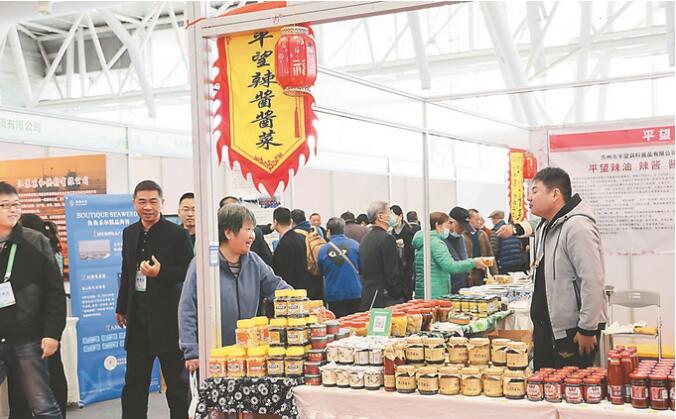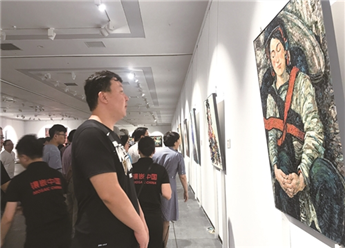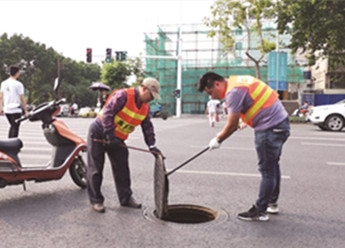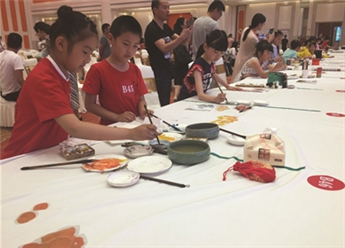接受新文化,拥抱微笑
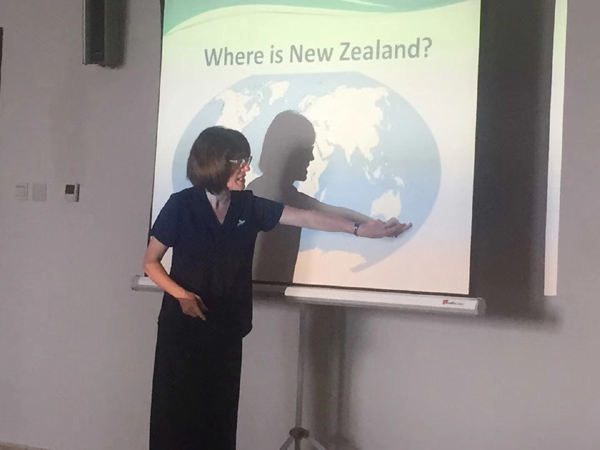
厄文·哈里斯在向她的宿迁朋友们介绍新西兰。
作者简介:厄文·哈里斯,新西兰籍,宿迁国际友城—新西兰因弗卡吉尔市市政厅友好城市关系经理,2017年8月赴宿迁市进行友好交流,并在宿迁工作生活2个月。在宿期间,她在宿迁市外办、体育局、宿迁学院等单位工作、学习,体验中华文化,进行友好交流。
对于一个新西兰人来说,在中国生活是一种充满乐趣、多姿多彩又具有挑战性的体验。
此时此刻,我正坐在我的小公寓里写下这篇文章,外面是郁郁葱葱的树木和碧蓝如洗的天空,还有不时传来的城市的喧哗声和隔壁幼儿园小孩嬉笑的声音。
代表团离开宿迁后,我就住进了这个小公寓,这个小区里有几百户人家。这里不是很高档的住所,应该是中国的百姓通常住的地方。上千位住户都住在这里,但是你不知道他们都去哪里了,因为小区里浓荫遮蔽使得整个环境很宜人。
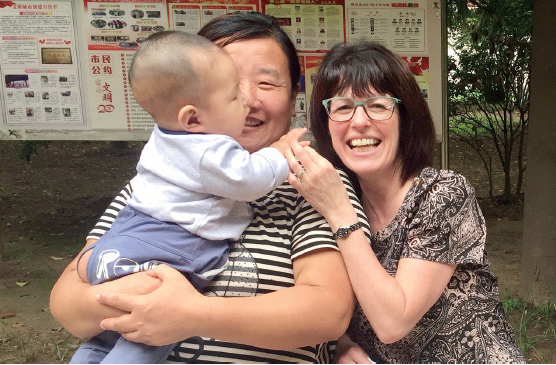
厄文·哈里斯与宿迁居住小区里的居民在一起。
我的室友是一个24岁的韩国女孩,她也是来宿迁进行国际友好交流活动的,我们相处得很好。我努力做一个善解人意的室友,比如按照她的意思,在浴室换上塑料拖鞋,然后在屋子里的其他地方时就换上其他拖鞋。
我的床上铺了一种竹子做的垫子,让人在炎热的夏天也能感到凉爽,那种感觉就好像睡在了木板上。我第一次睡的时候觉得很不舒服,但是现在已经适应了,可以快速入睡。
我每天5点多就会被窗外打扫的声响叫醒。这里的人们每天都打扫道路,清扫车每天早上很早就开始工作。
6点钟左右就能听见人们讲话的声音,也许是清晨锻炼的人们,但是因为有树的遮挡,所以我看不见他们在哪里。
每当我出门时,住在楼下的老奶奶们都会跟我打招呼。在中国,婆婆会帮儿子儿媳带孩子。在我的隔壁有一个奶奶带着她的小孙子,春春。他的脸圆圆的,非常可爱,每次见到我都会笑。而我每次遇见他们的时候,也会停下来和他们打招呼,向春春做鬼脸,逗他玩。当我走远时,我能听见他们在说“新西兰”。也许因为我是这里唯一的欧洲长相的外国人,所以他们对我有一些好奇。
虽然平时我是一个做事很有效率的成年人,但是在这里我就好像一个学前儿童。我刚来时不会说中文,不认识中国字,所以即使是很简单的事,因为语言不通,对我来说也变得困难,比如搭公车或者买东西。所以当我第一次成功搭上公车时,我的心情就像中了彩票一样!
在我的公寓不远处就有一些小商店。我最喜欢的是那间家庭式的小超市,很热闹,好像什么都有卖。回家的路上,我会跟小区门口穿着制服的两个保安说“你好”,他们就好像是《最后的夏日葡萄酒》里的人物。
在夏天和秋天,中国人会有更长的午休时间,然后继续下午的工作。他们晚上也会活动到很晚,所以在晚上,家长们会带着小朋友在广场玩耍,但是那个时候新西兰的孩子们都应该已经入睡了。我的午饭和晚饭都是在当地的小餐厅解决的。中国食物都被分成很小的一块一块,但是中国人每一餐都会吃很多道菜,我很想知道他们是如何保持得这么苗条的。
中国人很重视教育,因为他们认为,好好上学就能找到好的工作,才能为下一代提供好的生活。在中国,一些父母会给结婚的孩子准备一套新房和一辆车作为礼物。
在公寓附近有一个很西方风格的购物中心。这里的人们的穿着打扮和我们一样,他们也有手机,但是他们不用脸书,用的是微信,你甚至可以用微信直接扫二维码付款。
每个中国人都有身份证,所以我走到哪里都会带着我的护照。因为我是个外国人而且不是住在酒店里,所以我必须去当地的警察局申请暂住证。有一天我回到家里,发现来了两个警察,但是他们不会说英文,我就把他们请到屋里,给他们出示了我的证件并联系我的中国朋友与他们沟通。他们说这是常规检查,他们真的是非常友好的人。
宿迁市道路宽敞,绿树成荫。这里就像一个放大版的因弗卡吉尔市。宿迁有五百多万人口,但是城市规划非常好,平时我都会好奇这么多人究竟藏在哪里!
我现在理解了在新西兰的中国人的开车方式。在新西兰,即使是很远的路程,驾车也可以很快到达,因为很少有摩托车和行人。但是在中国,即使是很短的路程也可能耗费较长的时间,司机不能把车开得太快,因为路上有很多路人和骑着自行车或者电动车的人,这里的人们没有路怒症,他们会平静地接受。道路上也会有“嘟嘟”的喇叭声,但不是愤怒的喇叭声,只是提醒旁边的司机注意。
我在这里的旅程就快要结束,我很期待回家见到家人,但是我又不想时间过得太快,因为这真是一段奇妙的旅程。
我在这里结识了慷慨又热情的朋友,我感受到中国并不是西方媒体宣传的那样,我们对中国的刻板印象现在看来也十分荒唐,我对中国有了一个全新的印象。
我也感受到中国人和新西兰人一样,他们也热爱家庭,想要生活在一个安全、和平又舒适的环境里,接受新事物但是又很珍惜他们的文化和古迹。
作者:厄文哈里斯(新西兰)
译文
Embracing the Culture and the Smiles
Eirwen Harris
For a New Zealander living in China life is colourful, interesting and at times challenging.
I’m sitting on my bed in a tiny apartment in central Suqian tapping away on my laptop. It’s a stunning day with a clear blue sky and very warm but not too humid today. I hear the sounds of the inner city and children in the kindergarten next door.
When the delegation left Suqian I moved into the apartment which is not flash but serviceable and probably represents how ordinary Chinese live. There are several hundred apartments, with thousands of residents, in this complex – but you wouldn’t know because avenues of trees soften the whole place.
My flatmate is a 24 year old South Korean also in Suqian on a staff exchange. I try to be a considerate flatmate, obediently wearing my blue plastic ‘toilet slippers’ in the bathroom and changing into other slippers for the rest of the apartment.
The thing that struck me most was my bed. In my bed, there is a mattress topped with a bamboo mat to keep you cool in hot weather. It is like sleeping on a plank and the first night was very uncomfortable but now I fall straight to sleep.
I’m woken at 5.15am by the gentle swishing sound of someone sweeping the paths down below. They are constantly sweeping here – every road has people who sweep it many times a day and bus shelters seem to be polished at 9am on the dot.
At 6am music blares through loud speakers, possibly for an exercise class but I’ve never managed to catch a glimpse of it because of the trees.
As I leave the apartment I am greeted by the Grandma who lives downstairs. In China mothers-in-law look after their grandchildren while their parents work. My neighbour looks after her grandson, Chun Chun, a sturdy baby with a round, serious face that wreathes in smiles when he sees me. I always stop and say hello to Grandma and make a fuss of Chun Chun and all the other babies and grandmas she is gossiping to. Grandma has assumed proprietorial rights over me – and as I walk away I hear her announcing that I am from “Shin Sheeland”. As the only European around, I’m a bit of a curiosity.
For a usually efficient adult, it shocked me to realise that here I am like a toddler. I can’t speak to people, I can’t read words or numbers – so even simple things, like catching a bus or paying for something when you can’t see a price, are difficult. The first day I successfully caught a bus to work I felt like I’d won Lotto!
About two minutes’ walk away are the local shops. My favourite is the family-owned, two-storey supermarket, which is chaotic, noisy and sells a bewildering array of things. Walking back home I say a cheery “Nihau” to the two elderly uniformed security guards at the gate, who look like something from The Last of the Summer Wine.
During summer and autumn the heat and humidity mean that people take extra-long lunch breaks and work later. They also stay up late at night. There are families with small children out socialising in the plaza nearby at an hour when Invercargill children would be in bed. I go to the local diner for my lunches and dinners. Chinese people love food which consists of many small dishes – but they actually consume a lot during a meal – and I wonder how they stay so slim.
Education is very important here so people can get a good job to provide for their children. When a man gets married, his parents are expected to gift the newly-weds a new apartment and a new car. Near the apartment is a modern Westfield-like shopping mall. The people here dress just like us and have cell phones just like us – except instead of Facebook they use We Chat. You can even pay for your shopping using We Chat – they just scan your barcode.
Everyone in China has a national identity card and I take my passport everywhere. Because I’m a foreigner and no longer live in a hotel, I had to go to the local Police Station and apply for residency. One day I came home to find two black uniformed SWAT Police. They didn’t speak English. I invited them in, gave them my papers and then rang my English Interpreter to explain who I was. It was a routine apartment check and they were very nice people!
Suqian has wide, tree-lined streets. It feels like a massive version of Invercargill with 5.8 million people but is so well designed you wonder where they all are!
I now understand why Chinese people drive like they do when then come to New Zealand.
In New Zealand we drive long distances very fast, with few other motorists or pedestrians.
In China, distances take much longer to cover because motorists have to drive very slowly because there are hundreds of thousands of pedestrians, scooters and deadly-silent electric bikes everywhere.
There is no road rage just philosophical acceptance. There is a lot of tooting, but it’s not angry tooting, it’s a way of letting people know to take care because you are coming.
As my time here ends, I am excited to be going home to my husband, but trying not to wish the time away because it has been a special experience.
I have met wonderful, generous, kind-hearted people – and the ridiculous preconceived ideas I had about China and its people, shaped by my own ignorance, scaremongering and the western media, have been well and truly washed away.
I have learned that Chinese people want exactly what New Zealand people want – to love their families, live in safety and peace, in a clean environment, to embrace progress but value their heritage and culture.






